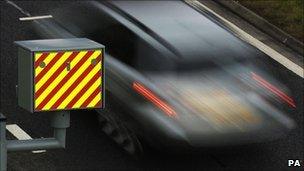EU urged to adopt foreign driver prosecution system
- Published

Drivers would be pursued in their own country for crimes committed abroad
Traffic police heads across Europe are urging the EU to adopt new rules so drivers can be punished for offences they commit abroad.
The European Traffic Police Network (Tispol) says at least 400 lives could be saved each year if people knew they would still be punished for offences.
They say such a system would be both fairer and safer.
Belgium, which currently holds the EU presidency, says reaching agreement on the issue is one of its top priorities.
EU figures suggest that foreign drivers account for around 5% of traffic, but around 15% of speeding offences.
Most go unpunished, with countries often unable to pursue drivers once they return home.
Tispol officers are urging the EU to make possible cross-border policing of traffic offences.
Ad Hellemons, Tispols's director, denied that it would be a complicated process.
"It just needs an agreement between the countries of the EU that they will all follow a certain procedure and that they will accept each other's enforcement activities," he said.
"In the end it's directly about human lives and people being injured and that should be, let's say, the number one priority that stands up front - and all the technical, legal stuff is, in fact, secondary."
Tispol argues that such a system would be fairer - with foreign drivers no longer able to escape the punishments given to domestic drivers - and safer, with greater enforcement acting as a deterrent.
It is likely that a driver's home authorities would pursue them on behalf of the foreign country.
And it would be up to drivers to make sure they know the rules of the country they are visiting - drink-drive laws in particular can vary widely.